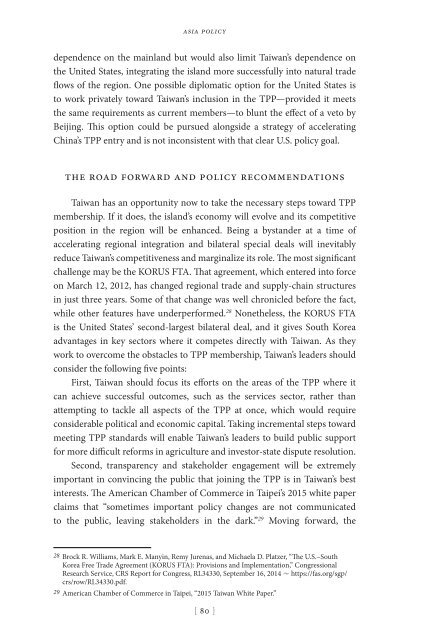You also want an ePaper? Increase the reach of your titles
YUMPU automatically turns print PDFs into web optimized ePapers that Google loves.
asia policy<br />
dependence on the mainland but would also limit Taiwan’s dependence on<br />
the United States, integrating the island more successfully into natural trade<br />
flows of the region. One possible diplomatic option for the United States is<br />
to work privately toward Taiwan’s inclusion in the TPP—provided it meets<br />
the same requirements as current members—to blunt the effect of a veto by<br />
Beijing. This option could be pursued alongside a strategy of accelerating<br />
China’s TPP entry and is not inconsistent with that clear U.S. policy goal.<br />
the road forward and policy recommendations<br />
Taiwan has an opportunity now to take the necessary steps toward TPP<br />
membership. If it does, the island’s economy will evolve and its competitive<br />
position in the region will be enhanced. Being a bystander at a time of<br />
accelerating regional integration and bilateral special deals will inevitably<br />
reduce Taiwan’s competitiveness and marginalize its role. The most significant<br />
challenge may be the KORUS FTA. That agreement, which entered into force<br />
on March 12, 2012, has changed regional trade and supply-chain structures<br />
in just three years. Some of that change was well chronicled before the fact,<br />
while other features have underperformed. 28 Nonetheless, the KORUS FTA<br />
is the United States’ second-largest bilateral deal, and it gives South Korea<br />
advantages in key sectors where it competes directly with Taiwan. As they<br />
work to overcome the obstacles to TPP membership, Taiwan’s leaders should<br />
consider the following five points:<br />
First, Taiwan should focus its efforts on the areas of the TPP where it<br />
can achieve successful outcomes, such as the services sector, rather than<br />
attempting to tackle all aspects of the TPP at once, which would require<br />
considerable political and economic capital. Taking incremental steps toward<br />
meeting TPP standards will enable Taiwan’s leaders to build public support<br />
for more difficult reforms in agriculture and investor-state dispute resolution.<br />
Second, transparency and stakeholder engagement will be extremely<br />
important in convincing the public that joining the TPP is in Taiwan’s best<br />
interests. The American Chamber of Commerce in Taipei’s 2015 white paper<br />
claims that “sometimes important policy changes are not communicated<br />
to the public, leaving stakeholders in the dark.” 29 Moving forward, the<br />
28 Brock R. Williams, Mark E. Manyin, Remy Jurenas, and Michaela D. Platzer, “The U.S.–South<br />
Korea Free Trade Agreement (KORUS FTA): Provisions and Implementation,” Congressional<br />
Research Service, CRS Report for Congress, RL34330, September 16, 2014 u https://fas.org/sgp/<br />
crs/row/RL34330.pdf.<br />
29 American Chamber of Commerce in Taipei, “2015 Taiwan White Paper.”<br />
[ 80 ]


